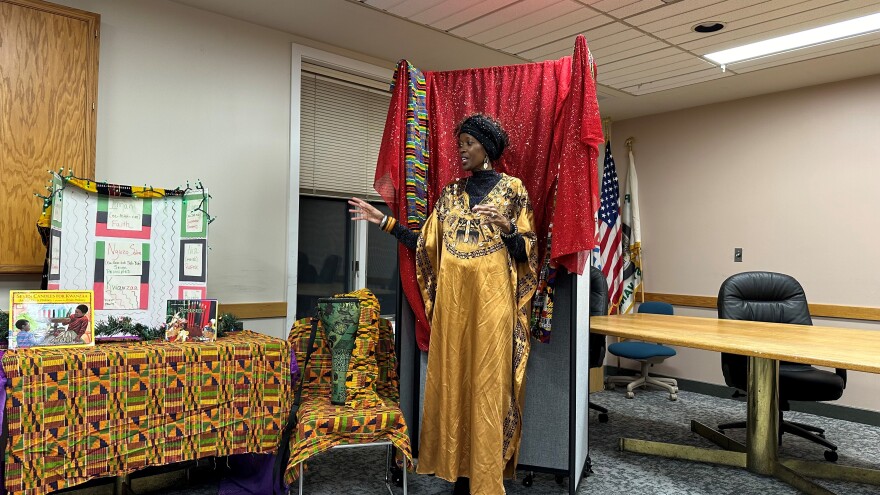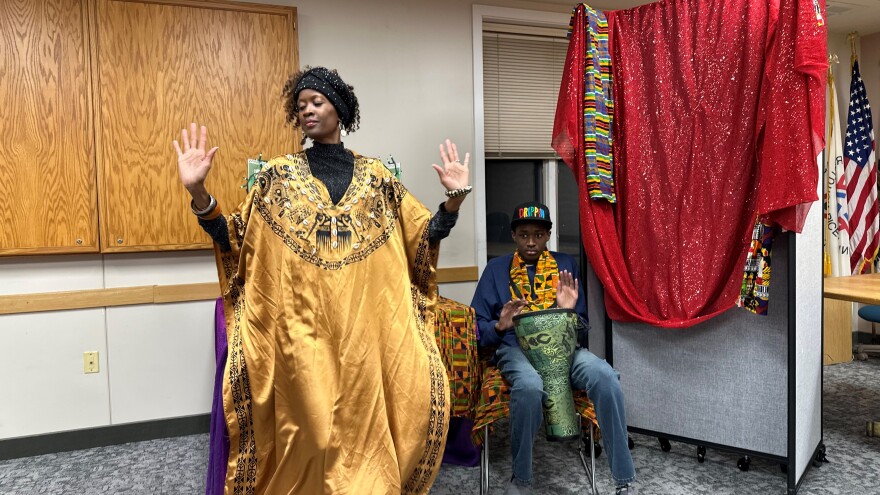EASTON, Pa. — Visitors to the Easton Area Public Library branch in Palmer Township had an opportunity to learn about and witness elements of the celebration of Kwanzaa thanks to the efforts of a local arts leader Thursday evening.
Held by Just Be You Academy & Performing Arts, a newly founded arts education and academic enrichment organization, the free holiday celebration included poetry, crafts, music and dance-alongs detailing the history and culture of Kwanzaa.
According to the National Museum of African American History and Culture, Kwanzaa is a celebration of families and communities, during which people come together to share a feast, honor ancestors, affirm bonds between one another, and celebrate African American culture.
It is celebrated from Dec. 26 through Jan. 1, and each day, a candle is lit to highlight the principle of the day and to instill a sense of meaning into those principles.
To do that, there are activities “such as reciting the sayings or writings of great Black thinkers and writers, reciting original poetry, African drumming and sharing a meal of African diaspora-inspired foods,” the NMAAHC states.
“And so the celebration is designed to help people, African Americans, bring those two together, and to help us to connect with our African culture and our history. And we like to share Kwanzaa with everyone in our community, no matter what your background is, because the root principles of Kwanzaa are applicable to anyone and everyone."Mahogany Reynolds-Clarke, founder and executive director of Just Be You Academy & Performing Arts
“The table is decorated with the essential symbols of Kwanzaa, such as the Kinara (Candle Holder), Mkeka (Mat), Muhindi (corn to represent the children), Mazao (fruit to represent the harvest), and Zawadi (gifts)," the NMAAHC’s explainer for Kwanzaa states.
"One might also see the colors of the Pan-African flag, red (the struggle), black (the people) and green (the future), represented throughout the space and in the clothing worn by participants.
"These colors were first proclaimed to be the colors for all people of the African diaspora by Marcus Garvey,”
Mahogany Reynolds-Clarke, founder and executive director of Just Be You, has hosted Kwanzaa celebrations since 2019. In 2020 and 2021, she hosted virtual events and by 2022 she again was able to celebrate in person at St. Paul’s Lutheran Church.
“My goal is to help bring awareness to the celebrations, and hopefully this time next year, the room will be filled, wherever I decide to host it," Reynolds-Clarke said at Thursday’s event.
"But we're going to celebrate it consistently no matter what.”

The evening began with Reynolds providing a brief explanation of Kwanzaa, noting it is not actually a religious holiday, but “a holiday that anyone can celebrate… no matter what your cultural background is.”
Reynolds-Clarke explained Kwanzaa officially began in 1966 when African Americans realized there was a disconnect between themselves and their cultural heritage.
“And so the celebration is designed to help people, African Americans, bring those two together, and to help us to connect with our African culture and our history," Reynolds-Clarke said.
"And we like to share Kwanzaa with everyone in our community, no matter what your background is, because the root principles of Kwanzaa are applicable to anyone and everyone."
Kwanzaa is a Swahili word, she explained, meaning “first fruits,” which ties the holiday to the common celebration of harvest.
Each day of the celebration focuses on one of the Nguzo Saba, or Seven Principles of Kwanzaa, including Umoja (Unity), Kujichagulia (Self-Determination), Ujima (Collective Work and Responsibility), Ujamaa (Cooperative Economics), Nia (Purpose), Kuumba (Creativity), and Imani (Faith).
“You can celebrate that in a variety of different ways. You can either demonstrate that [principle] to someone that you care for, that you want to be friends with, or you can also make them a card with that principle on it for the day," Reynolds-Clarke said.
"You can do a craft activity as a family with that principle of the day on there."
On the sixth day of the week, a feast called Karamu usually is held. There aren’t any particular dishes associated with the holiday, being that the meal is mainly rooted in reinforcing the principles celebrated throughout the week.
Reynolds-Clarke also pointed out that people sometimes give gifts during Kwanzaa, though there is an emphasis on handcrafting those presents as opposed to simply buying them, instilling them with even more meaning.
“And so that means if you know how to sew, or maybe you do art, or make jewelry, or anything that you think that you can make yourself, you give that to someone that you care about as their gift at the harvest dinner for Kwanzaa,” Reynolds-Clark said.
She said her family has celebrated in that manner “for a very long time.”
Concluding the presentation, Reynolds-Clarke played an African music track while her son Jeremiah Clarke handled live percussion with a djembe drum.
Decked out in an elaborately decorated golden dress, she expertly executed various moves with a natural flow that meshed with the rhythm of the music.
Having been a dancer since the age of 5, Reynolds certainly knew what she was doing.
Following the presentation, Reynolds-Clarke said she will continue to host events in the future, including Black History Month in February, Women’s History Month in March, and Juneteenth, with a goal of educating anyone interested about unique elements of culture and history which can bring people from all backgrounds together in celebration and peace.


